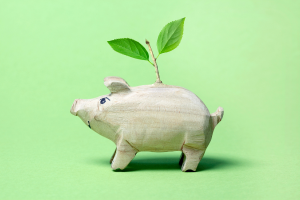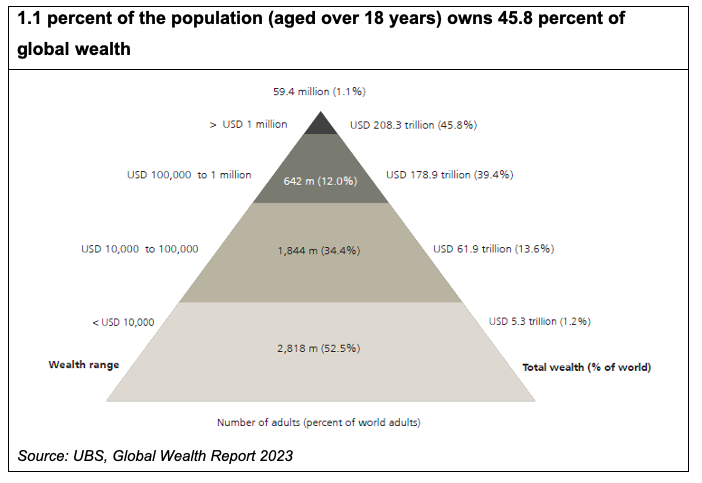Spotlight IR Magazine / UBS Global Wealth Report & Sustainability / 02/26/2024
In its “Global Wealth Report 2023”, the major Swiss bank UBS estimates global private wealth at USD 454.4 trillion. According to the bank, this amounts to an average of $84,718 per adult. Of course, this is only a statistical value, because in reality, private wealth is not evenly distributed.
For example, the UBS report puts the number of millionaires (in USD) at 59.4 million people, which corresponds to around 1.1 percent of the adult population. This small group owns $208.3 trillion in assets, nearly 50 percent of total global private wealth.
Use assets for a “better future”
It is nothing new that comparatively few people possess a great deal of wealth. From a global perspective, this has basically always been the case. What is new, however, is that more and more rich people seem to be using their wealth for sustainable purposes. They take on a certain responsibility with their prosperity. For the authors of the UBS study, this is an important point: “The right mobilization of private wealth is crucial in this time of change,” according to the Global Wealth Report. Whether as a source of investment or philanthropy, private wealth will help shape the opportunities offered by technological change. UBS demands: “Prosperity must be used for a better future.”
Buffett, Gates & Co.: the discovery of charity
In fact, numerous environmental projects could not be financed without financially strong private investors. An example of this is the now-deceased Douglas Tompkins, a multimillionaire and former entrepreneur from San Francisco. He sold his company shares and founded the Deep Ecology Foundation, which is involved in more than 50 environmental projects worldwide. For others, climate and environmental protection is also a means to an end. Bloomberg’s Billionaire Index, for example, contains numerous entrepreneurs who have acquired their wealth with products that are sustainable in the broadest sense. Just think of Tesla CEO and major shareholder Elon Musk. The “Giving Pledge” initiative by investor legend Warren Buffet and Microsoft co-founder Bill Gates is also very well known. It encourages the world’s richest people to donate the majority of their wealth to charity. 240 billionaires have already joined the initiative. After all, this is around ten percent of all billionaires worldwide.
ESG investments are trending among the wealthy
One way of working for a better world is to invest your assets in a sustainable way, if not to donate them. According to a survey by the consulting company Cap Gemini, 41 percent of the people surveyed with investable assets of more than one million US dollars stated that investments related to ESG are their top priority. 63 of the HNWI (High Net Worth Individuals) in turn stated that they have requested ESG ratings for their investments. ESG stands for Environmental, Social and Governance. Of the millionaires who are 40 years or older, 49 percent are interested in ESG investments, while the figure for millionaires under the age of 40 is 71 percent. So there is a clear difference between the generations.
The other side of the coin
The growing interest and commitment of wealthy people to the concerns of the planet is welcome. On the other hand, it must not be concealed that it is the rich who place an excessive burden on the environment and nature. According to a study by the development organization Oxfam, the richest one percent of the world’s population produces as many greenhouse gases that are harmful to the climate as the five billion people who belong to the poorer two-thirds of humanity. The fact that greenhouse gas emissions increase with private income and wealth has to do with higher consumption rates, for example, in the form of more frequent air travel or larger cars and houses.


